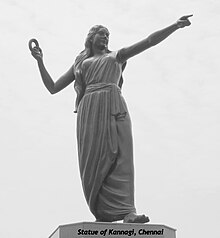Silambu
Silambu (Tamil: சிலம்பு; Malayalam: ചിലമ്പ് /cil’əmpɨ̆/), or Gaggara (Tulu: ಗಗ್ಗರ), is an anklet worn and used in many different ways on the Indian subcontinent.

Etymology
changeAccording to Jeyaraj, the word 'silambu' is derived from the verb 'silambal', meaning 'to make sound'.[1]
Description
changeThe silambu is filled with beads or small balls that make noise when the wearer moves or dances.[2] It may be worn on the ankle or the leg. When worn on the leg, it is called kālchilambu in Tamil.[3]
Some silambu are made of copper and use iron balls to make sound.[4] Others are made of silver.[5]
In dance
changeIn Tamil Nadu, a traditional dance called Kai Silambu Attam is danced at the temple during the Amman festival or Navratri festival. During this dance, the dancers wear silambu on their ankles and also hold them in their hands. They have different styles of jumping in their dance. This vibration produces sound in the silambu. Nautch and Kandyan dancers may wear silambu.[2][4]
In literature
changeThe main character of the epic Silappatikaram (a story of Silambu) is based on Kannagita's attempt to sell her anklet Silambu. The title comes from the name of the anklet.[6][7]
In festivals
changeSilambu are sometimes placed on cows' legs during the Pongal festival.[8]
Gallery
change-
Anklets, Tamil Nadu
References
change- ↑ Jeyaraj 1999, p. 39.
- ↑ 2.0 2.1 Sambamoorthy 1976, p. 6.
- ↑ Sambamoorthy 1976, p. 23.
- ↑ 4.0 4.1 Banerji, Projesh (1959). The Folk-Dance of India. Allahabad: Kitabistan. pp. 189–190.
- ↑ Marcuse, Sibyl (1975). "Silambu". Musical Instruments: A Comprehensive Dictionary. New York: Norton. p. 476. ISBN 9780393007589.
- ↑ Chakravarti, A. (1944). Jaina Literature in Tamil. New Delhi: Bhāratīya Jñāpītha. p. 51.
- ↑ The Śilappadikāram. Translated by Dikshitar, V. R. Ramachandra. Oxford University Press. 1939. p. 1.
- ↑ Sambamoorthy 1976, p. 24.
- Jeyaraj, V. (1999). "Analysis of a Bronze Anklet from Kerala". Museum's Journal. Government Museum, Chennai.
- Sambamoorthy, P. (1976). Catalogue of Musical Instruments Exhibited in the Government Museum, Chennai. Chennai: Principal Commissioner of Museums, Government Museum.